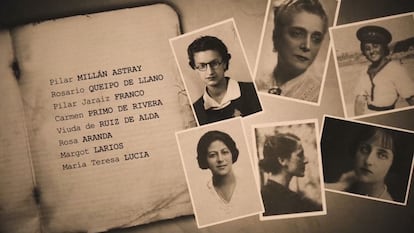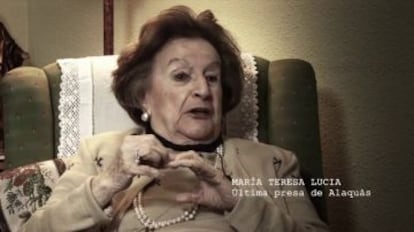The luxury prison where Franco’s niece was once held
New documentary tells story of Civil War “jail” that was home to women of high standing

In 1937, at the height of the Spanish Civil War, the Republican authorities in Valencia used a former country house on the outskirts of the city as a prison for women related to senior figures in Franco’s armed forces, as well as politicians and businessmen who supported the uprising.
It is still not entirely clear why they were locked up in the jail known as La Purísima: it may have been to use them as hostages, or simply to protect them from more radical elements in the Republican movement who would have shot them.
“There are virtually no studies about the Republican prisons during the Civil War, and even less about jails for female political prisoners”
Now, almost 80 years later, a Valencia film company is making a documentary about daily life in La Purísima, which today is a Jesuit spiritual retreat in Alaquás, close to Valencia airport. The producers of Cautivas (Captives) have talked to survivors and the relatives of the women held there, as well as historians such as British historian Paul Preston, who is an expert in the Spanish Civil War.
In the process, the makers have uncovered previously unknown memoirs written by Carmen Primo de Rivera, the sister of José Antonio Primo de Rivera, the founder of the Falange, the nationalist political party that Franco subsequently incorporated into his project. Antonio Primo de Rivera was captured in the first weeks of the Civil War in Madrid by the Republicans and held in jail in Alicante until his execution in November 1936.

In the summer of 1937, Carmen Primo de Rivera was installed in La Purísima along with her sister-in-law, Margot Larios, Pilar Millán Astray (sister of the founder of the Spanish Foreign Legion), Rosario Quiepo de Llano (sister of General Gonzalo Queipo de Llano, known as the Butcher of Seville), Pilar Jaraiz (Franco’s neice), and several others.
Carmesina Franch, the director of the film, says her aim is “to highlight the value of this unknown historic archive and to recreate a story that has never been told. There are virtually no studies about the Republican prisons during the Civil War, and even less about jails for female political prisoners. Each discovery has led us to new lines of investigation, to more hours of research and work.”
Franch and her team traveled throughout Spain to track down documents and other material related to La Purísima, looking into national and regional film and radio archives, the Civil War archives in Salamanca, and even those of the French secret service, working alongside academics from Valencia, Madrid and Granada.
“The building was beautiful and surrounded by a leafy park with orange trees, palms, eucalyptus and a small pine copse where we were allowed to spend some time on Sundays and Saturday afternoons. Along the wide corridors were the large, well-ventilated cells. From the windows it was possible to see beyond the park to the splendid Valencian countryside,” wrote Rosario Queipo de Llano about La Purísima.
“The building was beautiful and surrounded by a leafy park with orange trees, palms, eucalyptus and a small pine copse where we were allowed to spend some time on Sundays and Saturday afternoons”
“From their testimonies, it appears that the women were treated well,” says Franch, adding: “Those women were a weapon used by the Republic to halt the rebel forces. Within its walls, they certainly lived better than people in Valencia did, who were besieged by Franco.” Apparently, such was the fame of La Purísima that one of the staff who worked there later wrote a complaint to the authorities describing it as: “not so much a place of confinement as a place of leisure.”
In July 1938, as Franco’s forces closed in on Valencia, the women held in La Purísima were transferred to a jail in Cehegín, in Murcia. Some were also exchanged for Republican prisoners. Rosario Queipo de Llano and Primo de Rivera sailed from Valencia to Gibraltar, while Franco’s niece was sent to Marseille aboard a British vessel. None of the women there were harmed, although one of the female guards was subsequently executed in the grounds by Franco’s forces.
Tu suscripción se está usando en otro dispositivo
¿Quieres añadir otro usuario a tu suscripción?
Si continúas leyendo en este dispositivo, no se podrá leer en el otro.
FlechaTu suscripción se está usando en otro dispositivo y solo puedes acceder a EL PAÍS desde un dispositivo a la vez.
Si quieres compartir tu cuenta, cambia tu suscripción a la modalidad Premium, así podrás añadir otro usuario. Cada uno accederá con su propia cuenta de email, lo que os permitirá personalizar vuestra experiencia en EL PAÍS.
¿Tienes una suscripción de empresa? Accede aquí para contratar más cuentas.
En el caso de no saber quién está usando tu cuenta, te recomendamos cambiar tu contraseña aquí.
Si decides continuar compartiendo tu cuenta, este mensaje se mostrará en tu dispositivo y en el de la otra persona que está usando tu cuenta de forma indefinida, afectando a tu experiencia de lectura. Puedes consultar aquí los términos y condiciones de la suscripción digital.








































